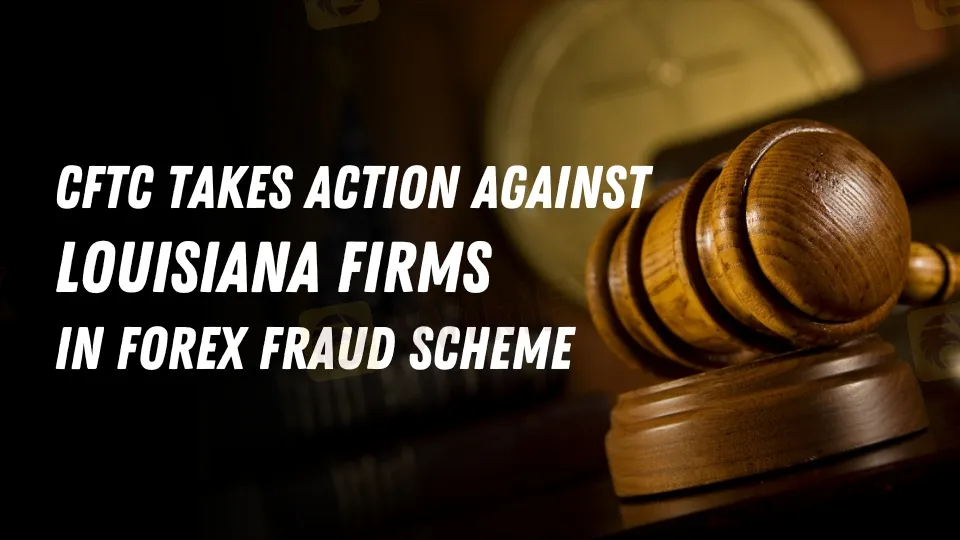简体中文
繁體中文
English
Pусский
日本語
ภาษาไทย
Tiếng Việt
Bahasa Indonesia
Español
हिन्दी
Filippiiniläinen
Français
Deutsch
Português
Türkçe
한국어
العربية
CFTC Takes Action Against Louisiana Firms in Forex Fraud Scheme
Abstract:The CFTC has filed a lawsuit against NOLA FX Capital Management and Meteor, LLC, for defrauding investors out of over $7.6 million in a forex scam.

Washington, DC - The CFTC has filed a civil enforcement action against two Louisiana-based firms, NOLA FX Capital Management, LLC and Meteor, LLC, as well as their creator, Michael B. DePetrillo. The action, filed in the Eastern District of Louisiana, claims that the defendants engaged in a fraudulent commodities pool scheme that resulted in the theft of more than $7.6 million from at least forty participants.
The complaint describes how the defendants solicited contributions from participants under the guise of pooling assets to trade foreign currency pairs leveraged via the NOLA FX Fund, LLC.
From July 2017 until the present, the entities allegedly supplied investors with fake account statements representing profits and trading activity that never happened. Instead of carrying out the promised transactions, DePetrillo and his firms are accused of utilizing the cash for personal purposes and to pay returns to previous investors, in a manner similar to a Ponzi scheme.
NOLA FX Capital and Meteor, according to the CFTC, operated unregistered commodities pools, while DePetrillo was an unlicensed pool operator related person. The CFTC is seeking reimbursement for the victims, civil monetary penalties, trading and registration prohibitions, and a permanent injunction against any future breaches of the Commodity Exchange Act and CFTC rules.
In a related development, the Eastern District of Louisiana US Attorney's Office has filed an additional criminal charge against DePetrillo.
Final Thoughts
This action demonstrates the CFTC's continuous efforts to prevent fraudulent schemes that prey on unwary investors. As financial markets develop, it is critical for investors to do rigorous due diligence and avoid offers that seem too good to be true. Participation in such scams may have disastrous implications for individuals engaged, both financially and legally.

Disclaimer:
The views in this article only represent the author's personal views, and do not constitute investment advice on this platform. This platform does not guarantee the accuracy, completeness and timeliness of the information in the article, and will not be liable for any loss caused by the use of or reliance on the information in the article.
Read more

Why Do Malaysians Keep Falling for Money Games?
Malaysia has seen a persistent rise in money game schemes, luring thousands of unsuspecting investors with promises of high returns and minimal risk. These schemes operate under various disguises, from investment clubs to digital asset platforms, yet they all follow the same fundamental principle—new investors fund the profits of earlier participants. Once the cycle collapses, the majority are left with devastating losses. Despite repeated warnings and high-profile cases, many Malaysians continue to fall victim. What drives this phenomenon?

RM 2.1 Million Lost: How a Company Director Fell for a Crypto Scam
A 77-year-old company director lost RM2.1 million after becoming a victim of a fraudulent investment scheme on cryptocurrency exchange platform. The incident occurred after he came across an advertisement on Facebook promoting a cryptocurrency investment opportunity in August.

Crypto.com Aims to Launch Cronos (CRO) ETF by 2025
Crypto.com plans to launch a Cronos (CRO) ETF by 2025, expanding its offerings with stocks, banking features, and a stablecoin amid regulatory scrutiny.

$10.25 Million Lost to Phishing Scams in Crypto Sector in January
In January 2025, crypto phishing scams showed a decline in overall losses but a significant rise in attack sophistication.
WikiFX Broker
Latest News
Robinhood Halts Super Bowl Betting Contracts After CFTC Request
3-Day Online Scam Trap: Victims Lose $200K—Don't Be Next!
XS.com Launches AI Insights to Transform Trading Behavior
Woman Scammed Out of RM200,000 in Investment Fraud
FCA Cautions Against ALT-COINFX
Why Do Some Brokers Block Your Withdrawals?
Japan's January PMI has been released, investors need to pay attention to these points!
Investment Scam on Telegram: How a Woman Lost Over RM65,000
Spotting Red Flags: The Ultimate Guide to Dodging WhatsApp & Telegram Stock Scams
WikiFX Review: Why so many complaints against QUOTEX?
Currency Calculator


